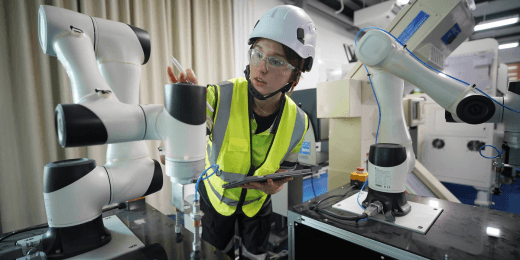Understanding Flexible Manufacturing Systems (FMS)
Learn how FMS can enhance productivity and efficiency in modern manufacturing.

Published 17 Mar 2025
Article by
5 min read
What is a Flexible Manufacturing System?
A flexible manufacturing system is an advanced production methodology that allows for the efficient and cost-effective manufacturing of various products while adapting to changes in demand and product types. It integrates computer-controlled machines, automated material handling systems, and software to facilitate quick adjustments in the production process, enabling manufacturers to produce small batches of customized products without significant downtime.
FMS enhances productivity and efficiency by minimizing setup times and allowing real-time adjustments. It is ideal for industries that require versatility and responsiveness to market trends.
Advantages
FMS could be ideal if a company operates in a competitive industry, producing large volumes of products with numerous potential variations. Here are some of the benefits of implementing an FMS in the manufacturing system:
Flexibility in Production: As the name suggests, FMS offers high flexibility in product customization. It can handle varying production volumes, add different product types, or allow for variations in a specific assembly line with minimal downtime.
Customization Option: Customers often want to tailor products to their style, taste, and needs. However, customization can be time-consuming and costly for manufacturers. FMS excels at efficiently simplifying the process of modifying and customizing products.
Speed and Efficiency: Automated systems and powerful machinery enable FMS to operate at high speeds while maintaining accuracy and precision. This feature allows for accelerated production times, improving overall efficiency.
Better Quality Output: With FMS, automated machines and software replace manual labor, reducing the risk of human error. This results in higher quality products and consistency in production.
Improved Intelligence and Control: FMS technologies gather valuable data that manufacturers can analyze to make informed decisions and optimize production processes. This feature helps reduce wastage, minimize downtime, and ensure efficient use of resources.
Reduced Labor Costs: FMS automates many processes that typically require manual labor, reducing the number of employees needed for production. This feature reduces labor costs and eliminates potential safety hazards associated with manual work.
Streamline Your Manufacturing Operations
Harness frontline insights, digital workflows, and seamless communication to boost efficiency and productivity across all manufacturing sites.
Disadvantages
While FMS offers numerous advantages, it also has some drawbacks to consider before implementing it in a manufacturing facility:
Comes with Increased Cost: If a company has cash flow issues, implementing an FMS may not be feasible. FMS’s significant up-front and maintenance costs can be expensive, which may prohibit smaller companies from adopting this production methodology.
Requires Technical Expertise: FMS depends on technology and skilled technicians to run and maintain it. This need for expertise may mean higher salaries and significant training time, so weighing the savings against the cost of training or hiring technical operators is important.
Limits with Future Changes: While an FMS is versatile, it may not be able to accommodate future changes in product types or manufacturing processes . Significant modifications or reprogramming may be necessary, which can add to the cost and time of implementing an FMS.
Involves Complex Planning: A system like FMS won’t run independently. It will require detailed plans, designs, schedules, and instructions to get started—which will take time. While this may balance out later, consider where this time investment fits your business and ensure you have the capacity and expertise to handle it.
Core Components
An FMS has several components that manufacturers can adapt and reconfigure to meet evolving production demands. Its core elements include:
Computerized Numerical Control (CNC) Machines: CNC machines are a crucial component of FMS, enabling manufacturers to produce complex shapes and parts with high precision. These automated machines can perform different tasks, such as cutting, milling, drilling, and grinding.
Automated Material Handling and Storage Systems: Material handling systems move materials and parts to the production line, between machines, and to storage areas. Examples include conveyor belts, Automated Guided Vehicles (AGVs), and robots. They help reduce manual labor, increase speed, and improve safety in the production process .
Control Computer System : Every FMS uses computers to control and gather data from stations across the system. They also help guide operators during production. Usually, additional computers stationed at different locations support the central computer. These computers manage traffic, control production, and monitor tools and workpieces.
Managers and Operators: FMS demands a skilled team of managers and operators who can oversee the system’s operation, perform maintenance, and troubleshoot any issues that may arise. Their role is vital in ensuring the efficient functioning of an FMS.
Types of Flexible Management Systems
FMS comes in different configurations, depending on the production requirements. The most common types include:
Engineered FMS
An engineered FMS is custom-designed to efficiently produce a specific type of part with precision and consistency over extended periods. These systems ensure speed, accuracy, and reliability in automotive manufacturing. They often feature robotic arms, automated cells, and conveyor systems.
Dedicated FMS
A dedicated FMS shares similarities with an engineered FMS but offers greater flexibility in handling a limited product mix. Dedicated FMS can produce a specific range of products in large quantities, making them highly effective for increasing manufacturing productivity. This makes them especially useful in aerospace manufacturing.
Sequential FMS
A sequential FMS includes a series of workstations that perform tasks on the product as it moves through each station. This type of system suits high-volume, repetitive production and frequently operates in the electronics and consumer goods industries.
Random FMS
Random FMS operates differently from sequential systems, offering flexibility and adaptability in manufacturing. These systems can produce various products and seamlessly adjust the processing order based on the manufacturer’s needs. For instance, when demand for a specific part rises, a random FMS can quickly ramp up production for that item and switch to other parts as demand decreases.
Modular FMS
Modular FMS represents the most advanced and versatile system in flexible manufacturing. It empowers machine operators to seamlessly transition between engineered, dedicated, sequential, and random modes based on current production needs. This adaptability is especially valuable for companies producing diverse products in varying quantities.
Optimize Flexible Management Systems with SafetyCulture
Why Use SafetyCulture?
SafetyCulture is a mobile-first operations platform adopted across industries such as manufacturing, mining, construction, retail, and hospitality. It’s designed to equip leaders and working teams with the knowledge and tools to do their best work—to the safest and highest standard.
Streamline processes, eliminate bottlenecks, enhance resource utilization, and build an agile and scalable infrastructure with SafetyCulture. Strive for operational excellence to boost competitive advantage, foster sustainable growth, and deliver long-term value.
✓ Save time and reduce costs✓ Stay on top of risks and incidents✓ Boost productivity and efficiency✓ Enhance communication and collaboration✓ Discover improvement opportunities✓ Make data-driven business decisions
Related articles
Operations
Business Processes

Understanding the Importance of Process Automation Reliability
Learn how reliable process automation is key to safe, consistent operations and how it minimizes quality and compliance risks.
Logistics
Operations

Transportation and Logistics: What’s the Difference?
Learn about the importance of transport and logistics within the supply chain and how it is used in business operations.
Logistics
Operations

An Overview of Transport Network Analysis
Learn about transport network analysis and how network-level insight improves reliability and reduces operational risk.